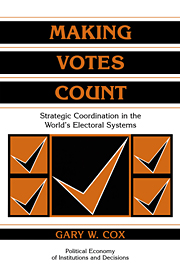Book contents
- Frontmatter
- Contents
- List of tables and figures
- Series Editors' Preface
- Preface
- PART I INTRODUCTION
- PART II STRATEGIC VOTING
- PART III STRATEGIC ENTRY
- PART IV ELECTORAL COORDINATION AT THE SYSTEM LEVEL
- PART V COORDINATION FAILURES AND DEMOCRATIC PERFORMANCE
- 12 Coordination failures and representation
- 13 Coordination failures and dominant parties
- 14 Coordination failures and realignments
- PART VI CONCLUSION
- APPENDICES
- References
- Subject Index
- Author Index
12 - Coordination failures and representation
Published online by Cambridge University Press: 05 August 2012
- Frontmatter
- Contents
- List of tables and figures
- Series Editors' Preface
- Preface
- PART I INTRODUCTION
- PART II STRATEGIC VOTING
- PART III STRATEGIC ENTRY
- PART IV ELECTORAL COORDINATION AT THE SYSTEM LEVEL
- PART V COORDINATION FAILURES AND DEMOCRATIC PERFORMANCE
- 12 Coordination failures and representation
- 13 Coordination failures and dominant parties
- 14 Coordination failures and realignments
- PART VI CONCLUSION
- APPENDICES
- References
- Subject Index
- Author Index
Summary
Most of this book has focused on successful electoral coordination and the conditions that facilitate such successes in practice. Coordination failures have certainly been noted but thus far not much has been said about their consequences. In this part of the book, I investigate how coordination failures affect various aspects of democratic performance, including those that touch on the representativeness of government policy (this chapter), the maintenance of dominant parties (Chapter 13), and the politics of realignment (Chapter 14).
I center the discussion in the present chapter on the following question of electoral engineering: How will democratic performance be affected when the electoral system broadly conceived (including both the legislative and executive election procedures) becomes stronger? This is a classic question in electoral studies to which there is a traditional (albeit contested) answer: Increasing the strength of the electoral system will decrease the representativeness of the polity's legislative and executive branches but will increase government stability. In the standard view, then, there is a grand trade-off entailed in any strengthening of the electoral system. I shall focus on the representational side of this tradeoff, investigating how the quality of representation changes with the politics of electoral coordination.
The chapter proceeds as follows. First, I discuss some of the various kinds of representation that an electoral system might affect. Representation is often defined as having one's views voiced in the legislative decision-making process.
- Type
- Chapter
- Information
- Making Votes CountStrategic Coordination in the World's Electoral Systems, pp. 225 - 237Publisher: Cambridge University PressPrint publication year: 1997



